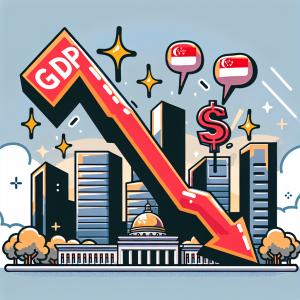The recent imposition of tariffs by former U.S. President Donald Trump has sent ripples through the global economy, raising concerns about potential repercussions for countries like Singapore. These tariffs, primarily targeting imports from countries such as China, Canada, and Mexico, were intended to protect American manufacturing and jobs. However, they have also sparked fears of a trade war, which could have significant implications for Singapore’s economy.
The tariffs, which have led to retaliatory measures from affected nations, have created a climate of uncertainty in global trade. According to analysts, the potential escalation of this trade conflict could hinder economic growth not only in the United States but also in countries that rely heavily on exports, such as Singapore. As a small, open economy, Singapore is particularly vulnerable to fluctuations in global trade dynamics. The impact of these tariffs could manifest in several ways, including increased costs for local businesses and consumers.
Higher tariffs on U.S. goods have already begun to affect the stock markets, with major indices like the S&P 500 and Dow Jones experiencing declines. This volatility is indicative of broader fears surrounding the economic implications of a prolonged trade dispute. Singaporean businesses, especially those in the retail and automotive sectors, may face rising costs as supply chains are disrupted. Such increases could ultimately lead to higher prices for consumers, impacting overall spending and economic growth.
Economic Projections and Concerns
Economists have projected that if the tariffs remain in place, they could reduce U.S. GDP by approximately 0.8% and decrease long-term economic output by 1.3%. For Singapore, which is heavily reliant on trade with the U.S. and China, these figures are concerning. The interconnectedness of global economies means that a slowdown in the U.S. could lead to reduced demand for Singaporean exports, further straining the local economy.
Moreover, the potential for inflation to rise due to increased costs of imported goods could also pose challenges for Singapore. As the nation grapples with its own inflationary pressures, the added burden of tariffs could exacerbate the situation, leading to higher living costs for residents. The Tax Foundation has estimated that while tariffs could increase U.S. federal tax revenues by $2.9 trillion over the next decade, the negative impact on economic output raises questions about the long-term sustainability of such measures.
Navigating the Uncertainty
In light of these developments, Singaporean investors and businesses are advised to remain vigilant. The current climate of uncertainty necessitates a careful approach to investment and financial planning. Experts recommend maintaining diversified portfolios to mitigate risks associated with market volatility. Panic-selling in response to market fluctuations could lead to significant losses, particularly in a landscape marked by ongoing geopolitical tensions.
As the situation evolves, it is essential for Singapore to monitor the developments closely. Policymakers must be prepared to adapt strategies to safeguard the economy against potential downturns linked to global trade disputes. The focus should remain on fostering resilience within the economy and exploring new trade partnerships that can help offset the impacts of tariffs.
In conclusion, while the tariffs imposed by Trump have created immediate challenges for the global economy, their long-term implications for Singapore will depend on how effectively the nation can navigate these turbulent waters. As the world watches the unfolding trade dynamics, Singapore’s economic future will hinge on its adaptability and strategic foresight in the face of uncertainty.





